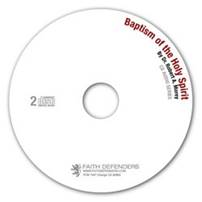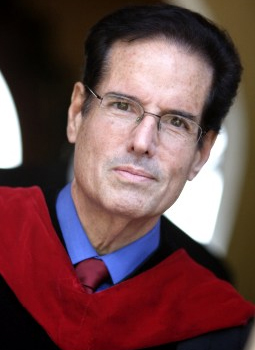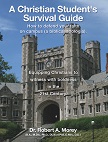The Baptism of
the Holy Spirit
By Dr. Robert A. Morey
© Copyright Faith Defenders
Introduction
This subject is one of great controversy because of extreme positions and emotions. We need to develop biblical balance on this issue in order to escape all the false teaching of our day.
1. The Person of the Holy Spirit
A. The Deity of the Spirit: He is God.
1. He is called "God" (Acts 5:3, 4; 2 Cor. 3:17).
2. He has the attributes of God (Heb. 9:14).
B. He is a "Person" and not an impersonal force.
1. He has the attributes and the names of a person (John 14:16-17; 15:26; 16:7-15).
2. He can be lied to (Acts 5:3-4).
3. He has a “will” (l Cor. 12:7-11).
4. He can be grieved and quenched (Eph. 4:30; 1 Thess. 5:19).
C. He is distinct from the Father and the Son. We must reject two growing heresies:
1. Sabellianism: The "Jesus Only" cult and heresy.
2. Modalism: One God in three forms or faces.
II. The Work of the Holy Spirit
A. In the Old Testament and New Testament (before Pentecost)
1. He indwelt the saints (Gen. 41:38; Num. 27:18; cf. Deut. 34:9; Dan. 4:8, 9, 18; 5:11, 14; 6:3;
1 Pet. 1:11; 2 Cor. 4:13; Lk. 1:15; John 3:3, 5; John 14:17; John 20:22; Rom. 8:9-11; 1 Cor.
2:10-16; 1 Cor. 12:3).
2. He came "upon" and "filled" the saints.
a. "Upon": Judges 3:10; 15:14, etc.
b. "Filled": Deut. 34:9; etc.
3. "The Filling of the Spirit" meant the desire and power to do God's will.
4. A special outpouring of the Holy Spirit was prophesied in the Old Testament (Joel 2:28-32): No racial, sexist, age or social discrimination in this outpouring (no race, rank, sex, age).
a. Isa. 32:15-20: It will bring peace and prosperity to God's people.
b. Ezk. 39:25-29: It will mean an end of God's judgment and the beginning of World Missions.
B. In the New Testament
1. Before Pentecost
a. He indwelt pre-Pentecost New Testament saints (John 3:3, 5; 14:17, NAS). b. He filled pre-Pentecost saints (Luke 2:25-27).
c. He came "upon" pre-Pentecost saints (Luke 2:25-27).
d. He was "breathed" on pre-Pentecost saints (John 20:22).
e. John the Baptist prophesied that Jesus would "baptize with the Spirit" (Matt. 3:11).
(1) The agent is Jesus.
(2) The means is the Spirit.
(3) This was a future experience that Jesus was to give to His people. (4) It was to be opposite and different from John's baptism.
C. The teaching of Christ
1. He prophesied that a special outpouring of the Spirit would occur when He was glorified at the right hand of the Father (John 7:37-39). At that time He would give them the
promise of the Father that was the outpouring of the Spirit in fulfillment of the New Covenant prophecies in the Old Testament. This promised outpouring would mean power (Lk 24:49).
2. When this outpouring took place, the Spirit would begin to function in new ways. He would take the place of Christ as the Paraclete (John 14:16-26; 15:26-27; 16:5-15).
3. While Jesus referred to a future outpouring of the Spirit, He also referred to a regular infusion of the Spirit's power and guidance whenever the believers needed it (Lk. 11: 13). Just ask the Father for it.
4. Just before He ascended, Jesus prophesied that the outpouring of the Spirit or "baptism with
the Spirit" would mean power. The particular focus or purpose of this power is missions and evangelism (Acts 1:5-8). This echoed Christ's teaching in Lk. 24:46-49.
5. The promise of power for proclamation is part of the Old Testament prophecy that all racial, rank, sex and age barriers would be undone by the universal work of the Spirit in the New Kingdom age (Joel 2:28-32). All God's people would be anointed evangel-priests.
6. Jesus never spoke of this outpouring as "indwelling" or "salvation." It had reference to something that would happen to people already indwelt and saved.
D. The Outpouring at Pentecost
1. The disciples waited in prayer for Jesus to "pour out" the Spirit or "baptize" them "with the
Holy Spirit" (Acts 1:5-8, 12-14; 2:1-4).
2. The "outpouring" or "baptism with the Spirit" took place as Jesus was glorified. a. Jesus glorified by the Father (Acts 2:33).
b. The Spirit poured out by Jesus (Acts 2:33).
c. This outpouring was the promise of the Father (Acts 2:33).
3. It was a fulfillment of the Old Testament prophecies (Acts 2:33).
4. It is said that the disciples were "filled" with the Spirit (Acts 2:4). "Baptism with the Spirit" up to this point always refers to the "filling of the Spirit." The "filling of the Spirit" refers to Pentecost, and Pentecost means power for evangelism.
5. Thus, "baptism" and "filling" are at this point the same. prophecy: "baptized with the Holy Spirit"
fulfillment: "filled with the Holy Spirit"
6. Is there any indication that this was a once for all event, i.e., the only fulfillment of the Old and New Testament prophecies? Answer: No. The Old Testament and New Testament prophecies clearly marked out the entire age of "the last days" as the age of the Spirit. The Spirit would function the same throughout the time from Christ's glorification to the return of Christ. Who would limit John 14, 15, 16 to Pentecost? Why then do they limit Matt. 3:11
or John 7:37-39 only to Pentecost?
7. Pentecost was not conversion, salvation or indwelling. It was power for proclamation.
"Filling leads to speaking" sequence.
a. Old Testament background: Num. 11:25
b. New Testament pattern: Acts 2:4; 4:8, 31; Eph. 5:18
8. The proclamation was here in Spirit-given, unknown languages (tongues) (Acts 2:4).
9. Peter did not believe that he and the others were the only ones who could receive the promise of the Spirit. He offers this same experience to all who believe (Acts 2:5, 8, 38, 39). Thus the "promise" of the Holy Spirit (i.e., the "baptism," "filling" or "outpouring" of the Spirit) is something for everyone and cannot be limited to Pentecost. Pentecost was the first baptism with the Spirit but not the final one.
E. After Pentecost in the Acts
Note: That Pentecost was the first baptism of the Spirit and not the final one is irrefutable. Why?
1. Peter himself describes what happened to Cornelius and his family as a fulfillment of Matt.
3:11 (Acts 10:44-46; 11:15-17; 15:7-11). Thus we cannot limit the Old Testament and New
Testament prophecies of a future "outpouring" or "baptism" to Pentecost.
2. Since the "filling of the Spirit" is what the "baptism with the Spirit" is all about, it is important to point out that this experience happened again and again throughout Acts to individuals
and churches (Acts 1:5, 8; 2:4; 4:8, 31; 9:17; 13:9, 52).
3. Some people were marked out as being especially filled with the Holy Spirit (Acts 6:3, 5; 13:52).
4. The predominant effect of being filled with the Spirit (baptized with the Spirit) is proclamation.
Sometimes tongues appeared, other times they did not.
Acts 2:4 - Tongues 8:16-17 - Tongues
Acts 4:8 - No Tongues 10:44-46 - Tongues
Acts 4:31 - No Tongues 19:6 - Tongues
5. It has been suggested by some that we need to view the prophecy of Acts 1:8 as predicting four different Pentecosts.
![]()
![]() Acts 1:8
Acts 1:8
Jerusalem |
Judea |
Samaria |
The Ends of the Earth |
(2:4) |
(4:31) |
(8:16-17) |
(10:44-46) |
6. But can we say that there were only four baptisms or outpourings? One for each race or rank of mankind? Answer: No. We have all the other baptisms with the Spirit or fillings with the Spirit throughout Acts (Acts 2:4; 4:8, 31; 19:6). They often involved the same people again.
7. The "baptism with the Spirit" or "filling with the Spirit" is repeatable and normative for this entire age (Acts 13:52).
8. It is something that is experienced after conversion (Acts 2:4) or simultaneously with conversion (Acts 10:44-46). No rule can be made either way. It is to be repeated all the time.
9. Its primary effect or evidence is bold proclamation (with or without tongues): (Acts 2:4; 4:31).
10. No distinction was made between "baptism" and "filling" with the Spirit in the book of Acts.
11. The "filling" or "baptism with the Spirit" is an experience or blessing that all believers are commanded to seek (Eph. 5:18) . It is also called "walking in the Spirit" and is recommended
in Gal. 5:16-26 for all believers. Those who are "Spirit-filled" are called "spiritual" in Gal. 6:1 as a way to distinguish between believers.
12. The "filling" or "baptism with the Spirit" is needed for:
a. prayer: Jude 20
b. worship: Phil. 3:3
c. mortification of sin: Rom. 8: 13
d. daily living: Eph. 5:18; 6:18
13. In distinction from Jesus baptizing us with the Spirit, Paul mentions that the Spirit baptizes us into the Body of Christ at the new birth and, at that time, equips all believers with at least one spiritual gift: (l Cor. 12:3-13; Rom. 12:3-8).
The Baptism with the Spirit (Matt. 3:11) |
The Baptism by the Spirit (1 Cor. 12:3; 8-13) |
Agent: Jesus |
Agent: Holy Spirit |
Medium: Holy Spirit |
Medium: Power of the Spirit |
Goal: The desire and power to do God's will: “filling with the Spirit." |
Goal: Incorporation into the Body and equipping with gifts. |
Result: Bold proclamation, missions, evangelism, practical living. |
Result: The unity and functioning of the Body of Christ. |
14. In 1 Cor. 12:3-11, Paul is describing what the Spirit does. The Spirit gives gifts (4-11) and unity to the church (v. 13). Paul is not referring to the filling or baptism of the Spirit, which is only true of some Christians some of the time (a repeatable experience). Paul is talking about a non-repeatable experience, once for all time in the life of every Christian, when he or she was engrafted into the Body and gifted for ministry within the Body.
![]() "The Baptism by the Spirit” into the Body of Christ (non–repeatable, final)
"The Baptism by the Spirit” into the Body of Christ (non–repeatable, final)
Conversion
![]()
![]()
![]()
![]() 0 0 0 0 0 0 0 0 0 0 0 0 0 0
0 0 0 0 0 0 0 0 0 0 0 0 0 0
The filling or baptism with the Holy
Spirit (repeatable)
15. 1 Cor. 12:13
a. Some think it refers to water baptism.
b. Some think it refers to Matt. 3:11 or Acts 2:4.
c. But it is describing something spiritual, not carnal such as water (See Hodge's commentary).
16. The baptism by the Spirit in 1 Cor. 12:13 finds its parallel in the "sealing" by the Spirit (Eph.
1:13; 4:30; 2 Cor. 1:21-22) and the "anointing" by the Spirit (l John 2:20, 27; 2 Cor.
1:21).
1 Cor. 12:13 |
Acts 1:8; Eph. 5: 18 |
|
at conversion |
daily |
|
engrafted into the body |
gifted for ministry |
power for witnessing and power for living the |
once for all time |
repeatable |
|
all Christians have it |
some Christians have it |
|
don't seek it |
seek it |
|
position |
power |
|
salvation |
sanctification |
|
Conclusion
1. Historic Pentecostal theology is in error when it states:
a. Old Testament saints were not indwelt by the Holy Spirit. b. 1 Cor. 12:13 is not an experience of all Christians.
c. There is a "Second Work of Grace" called "the Baptism of the Holy Spirit" (non-repeatable) and the only sign of it is speaking in tongues.
2. Historic anti-Pentecostal theology is in error when it states:
a. The 1 Cor. 12:13 experience is all there is to the Christian life. There is nothing more.
b. The "baptism with the Holy Spirit" was fulfilled in its entirety at Pentecost.
c. We don't need to seek any deeper experiences with God. We got all we will ever need at regeneration.
Recommended CD:

 Is the “baptism of the Holy Ghost and fire” found in Pentecostal and Charismatic churches of God or of the devil? Of the flesh or of the Spirit? In a balanced exegetical study of the issue, Dr. Morey clears up all the confusion over the issue of the baptisms and filling of the Spirit.
Is the “baptism of the Holy Ghost and fire” found in Pentecostal and Charismatic churches of God or of the devil? Of the flesh or of the Spirit? In a balanced exegetical study of the issue, Dr. Morey clears up all the confusion over the issue of the baptisms and filling of the Spirit.
FAITH DEFENDERS
www.faithdefenders.com






































